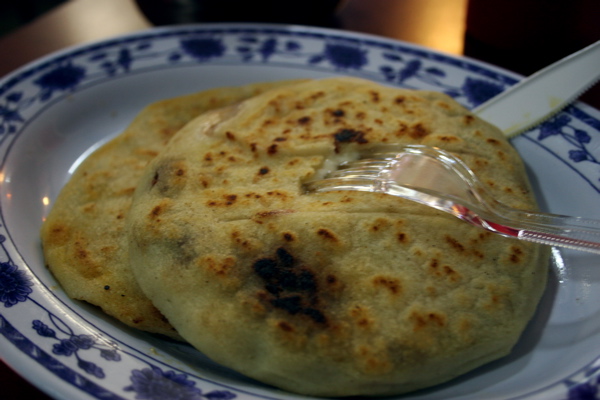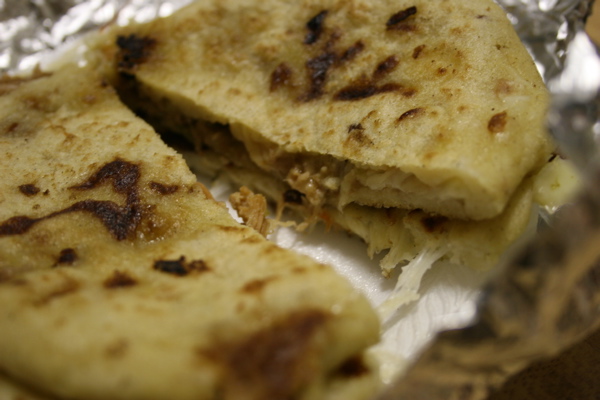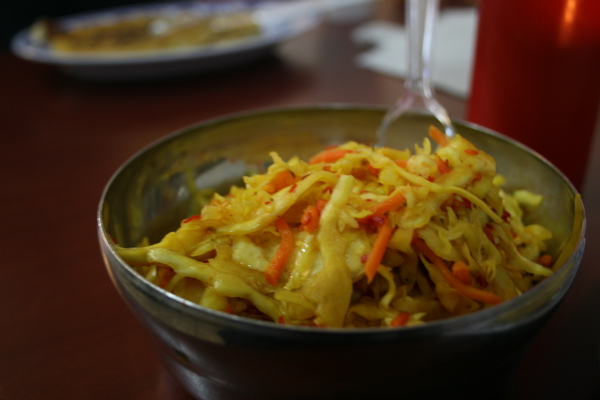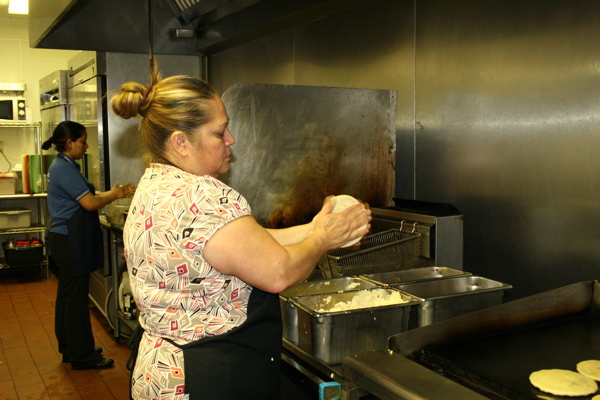
If a warm, gooey cheese sandwich on toasted bread is your idea of comfort food, then you’ll love Salvadoran pupusas. Pupusas (pronounced pooh-POOH-sahs) are savory corn pancakes stuffed with cheese, beans, or pork and griddled until they are mottled brown and the filling is heated through. They are traditionally eaten topped with curtido, a pickled and sometimes spicy cabbage and carrot slaw, and a mild tomato sauce.
Pupuserías in Minneapolis and St. Paul typically offer a variety of fillings or combinations of fillings including queso (cheese), frijoles (beans), chicharrón (shredded pork or pork cracklings), ayote (squash) or loroco (an edible, green flower commonly used in Central American cooking). Revueltas is a combination of fillings. Two or three pupusas, at $2-$3 a piece depending on the fillings, are usually enough for a meal. And while they’re considered finger food in El Salvador, it’s not uncommon for Twin Cities restaurants to provide you with a fork and knife.

Matters of table etiquette aside, are the pupusas we get at restaurants in the Twin Cities authentically Salvadoran? To find out, the Heavy Table called Rosario Diaz, the owner of Mañana Restaurant in St. Paul, who agreed to tell us, with her son Moris Páiz serving as interpreter, everything a person would want to know about pupusas, which she calls “the main dish of El Salvador.”
Diaz says she’s had to adapt her pupusas recipe from the classic Salvadoran preparation because, although she makes several trips to El Salvador each year to stock up on authentic ingredients, certain ingredients and facilities just aren’t available here. Through Páiz, Diaz said, “I try to use Salvadoran products, including beans and cheese, whenever possible. I travel to El Salvador two to three times a year and bring back whatever they will let me. Nothing with a seed.”
In El Salvador, Diaz would make her own masa by cooking the corn, then taking it to a community mill, called a molino, and grinding it herself in the big grinders. Here in Minnesota, she purchases Maseca brand masa harina, which is already milled. Traditionally, pupusas are filled with quesillo, a stringy, soft cheese, that has a “better taste, and is cheese from the farm”; Diaz finds mozzarella to be closest in taste and texture.
Everything else is the same. Though each pupusa is made to order, Diaz prepares the masa every other day. She cuts, fries, and dries her own pork for the chicharrón. Diaz’ son, Páiz, who also helps out at Mañana, truly a family operation, says that Diaz “Has the right hand touch in measuring the meat and cheese and in how she makes the beans and chicharrón. You don’t want to grind the chicharrón too thin, so it doesn’t shatter.” After letting the chicharrón dry for a day, Diaz adds onions, tomatoes, pepper and salt and grinds it all into a paste using a special electric grinder she had custom-made in El Salvador.

The curtido, made of shredded cabbage, carrot, onions, salt, red pepper, vinegar and a touch of color to give it its sunny yellow hue, is made a day or two in advance so that it has time to soak.

Diaz showed me how she assembles a revueltas pupusa. First, she pinches off a palmful of masa dough and forms it into a hamburger-sized patty. She adds to the center of the patty a smear of chicharrón, a smidge of refried beans, and about a tablespoon of cheese, then curls the edges of the patty up and over the fillings, pinches them together at the top to form a ball, and discards the excess masa. She pats the ball flat, into an remarkably thin pancake, then flops it on the griddle, which is well oiled, but not pooled with grease. Páiz says too thick a pancake or too much oil on the griddle will render a pupusa soggy and greasy. Diaz can tell by watching the pupusas bubble and cook, like you would a pancake, especially around the edges, when they’ve achieved a paper-thin, brittle crust and are ready to flip for griddling on the other side.
Minneapolis and St. Paul have numerous pupuserías. Here are three to explore:

Mañana Restaurant
828 7th St E.
St. Paul
651.793.8482
Mañana Restaurant is a cheery little establishment with colorful flags suspended from the ceiling that serves up authentic Salvadoran, Mexican and Puerto Rican cuisine, including plantain empanadas and a popular sweet corn drink “atol de elote”. Their pupusas, especially the revueltas with pork, cheese and beans, are robust and flavorful. Their curtido, with pleasingly uniform shreds of pickled carrots and cabbage, bites back.
Pupusería El Rincón Salvadoreño
in Mercado Central
1515 E. Lake St
Minneapolis
612.728.5442
Pupusería El Rincón Salvadoreño makes a great stop if you happen to be at the Mercado to pick up some sweets from the Panadería El Mexicano bakery, a piñata for the kids from Dulcería La Piñata, or some fresh tortillas from La Perla’s. The hustle and bustle and people-watching at the Mercado is always worth the trip.
El Rincón Salvadoreño’s pupusas tend to be salty, but they are generously filled and their chicharrón is shredded pork, which provides an interesting texture contrast. As long as you push aside the garnish of sliced jalapeño peppers, their curtido is on the mild side, an option that would especially appeal to the spice averse, while their tomato sauce is smokey and spicy. El Rincón Salvadoreño also makes their pupusas to order and you can monitor their progress as by listening for the “pat pat pat” of your pupusa being flattened into shape while you wait, or, you can wander the market for ten minutes and come back to claim your meal.
La Hacienda
in Sibley Plaza
2467 7th St W.
St. Paul
651.699.3213
A cozy, friendly restaurant with brightly-colored murals covering the dining room walls, La Hacienda specializes in Mexican, Peruvian and Salvadoran cuisine. La Hacienda’s pupusas are relatively thick and doughy and are generously stuffed, but never achieve the crisp exterior of Mañana’s. The tomato sauce, house-made, is served on the side and is sweet and tangy, delicious enough that you almost want to ask for a spoon so you can finish it off, while the curtido is roughly-chopped and heavy on the red onion.
